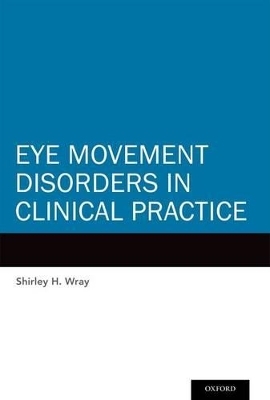
Eye Movement Disorders in Clinical Practice
Seiten
2014
Oxford University Press Inc (Verlag)
978-0-19-992180-5 (ISBN)
Oxford University Press Inc (Verlag)
978-0-19-992180-5 (ISBN)
- Titel ist leider vergriffen;
keine Neuauflage - Artikel merken
In Eye Movement Disorders in Clinical Practice, a leading expert with over thirty years of teaching experience in neurology and neuro-ophthalmology offers comprehensive instruction on the diagnosis and treatment of all types of eye movement disorders.
In Eye Movement Disorders in Clinical Practice, a leading expert with over thirty years of teaching experience in neurology and neuro-ophthalmology offers comprehensive instruction on the diagnosis and treatment of all varieties of eye movement disorders. This important new text reflects the importance of correlating clinical signs of disorders in the oculomotor system with their neuroanatomic and neurophysiologic architecture. With its focus on signs and symptoms, the book advances lesion localization of eye movement disorders as the central clinical concern. The reader is also presented with a fresh review of bedside examination techniques in the ER, ICU, and walk-in clinic; productive ways of taking a clinical history; sign interpretation; source lesion localization; and, where appropriate, therapy.
Unlike most of the titles on eye movement disorders, this book's chapters are arranged according to objective signs - like ptosis, neuromuscular syndromes, dizziness, vertigo, and syndromes of the medulla - rather than disease entities. This emphasis on the topographic analysis of symptoms and signs is contrary to the prevailing clinical approach in which responsibility for therapy typically drives the clinician to arrive at an etiological diagnosis as rapidly as possible. At risk in this process is nothing less than the art of clinical medicine. One of the aims of this book is to reverse this process, and move clinicians back to the observation and interpretation of signs.
The text features over 100 clinical cases, each one challenging the reader to determine the neuroanatomical location of the patient's lesion. This exercise provides the anatomical guidance needed to make critical diagnostic and management decisions in patients who often present with abnormal eye movements. Supplemental online videos are available with purchase.
Dynamic and intellectually stimulating, Eye Movement Disorders in Clinical Practice is essential for any reader wanting to better understand eye movement disorders.
In Eye Movement Disorders in Clinical Practice, a leading expert with over thirty years of teaching experience in neurology and neuro-ophthalmology offers comprehensive instruction on the diagnosis and treatment of all varieties of eye movement disorders. This important new text reflects the importance of correlating clinical signs of disorders in the oculomotor system with their neuroanatomic and neurophysiologic architecture. With its focus on signs and symptoms, the book advances lesion localization of eye movement disorders as the central clinical concern. The reader is also presented with a fresh review of bedside examination techniques in the ER, ICU, and walk-in clinic; productive ways of taking a clinical history; sign interpretation; source lesion localization; and, where appropriate, therapy.
Unlike most of the titles on eye movement disorders, this book's chapters are arranged according to objective signs - like ptosis, neuromuscular syndromes, dizziness, vertigo, and syndromes of the medulla - rather than disease entities. This emphasis on the topographic analysis of symptoms and signs is contrary to the prevailing clinical approach in which responsibility for therapy typically drives the clinician to arrive at an etiological diagnosis as rapidly as possible. At risk in this process is nothing less than the art of clinical medicine. One of the aims of this book is to reverse this process, and move clinicians back to the observation and interpretation of signs.
The text features over 100 clinical cases, each one challenging the reader to determine the neuroanatomical location of the patient's lesion. This exercise provides the anatomical guidance needed to make critical diagnostic and management decisions in patients who often present with abnormal eye movements. Supplemental online videos are available with purchase.
Dynamic and intellectually stimulating, Eye Movement Disorders in Clinical Practice is essential for any reader wanting to better understand eye movement disorders.
Shirley H. Wray, MD, PhD, FRCP is Professor of Neurology at Harvard Medical School and Director, Unit for Neurovisual Disorders, Department of Neurology, Massachusetts General Hospital, Boston, MA
Chapter 1 HOW THE BRAIN MOVES THE EYES ; Chapter 2 THE EYELID AND ITS SIGNS ; Chapter 3 PTOSIS AND NEUROMUSCULAR SYNDROMES ; Chapter 4 THE EXTRAOCULAR MUSCLES AND DIPLOPIA ; Chapter 5 CRANIAL NERVES THREE, FOUR, SIX AND THEIR SYNDROMES ; Chapter 6 HORIZONTAL GAZE AND SYNDROMES OF THE PONS ; Chapter 7 VERTICAL GAZE AND SYNDROMES OF THE MIDBRAIN ; Chapter 8 DIZZINESS, VERTIGO AND SYNDROMES OF THE MEDULLA ; Chapter 9 THE CEREBELLUM AND ITS SYNDROMES ; Chapter 10 OSCILLOPSIA, NYSTAGMUS, SACCADIC OSCILLATIONS AND INTRUSIONS
| Erscheint lt. Verlag | 27.3.2014 |
|---|---|
| Verlagsort | New York |
| Sprache | englisch |
| Maße | 185 x 262 mm |
| Gewicht | 1304 g |
| Themenwelt | Medizin / Pharmazie ► Medizinische Fachgebiete ► Augenheilkunde |
| Medizinische Fachgebiete ► Chirurgie ► Neurochirurgie | |
| Medizin / Pharmazie ► Medizinische Fachgebiete ► Geriatrie | |
| Medizin / Pharmazie ► Medizinische Fachgebiete ► Neurologie | |
| Medizin / Pharmazie ► Medizinische Fachgebiete ► Pädiatrie | |
| ISBN-10 | 0-19-992180-6 / 0199921806 |
| ISBN-13 | 978-0-19-992180-5 / 9780199921805 |
| Zustand | Neuware |
| Haben Sie eine Frage zum Produkt? |
Mehr entdecken
aus dem Bereich
aus dem Bereich
Buch | Hardcover (2024)
De Gruyter (Verlag)
CHF 153,90
Buch | Hardcover (2023)
Springer (Verlag)
CHF 307,95


